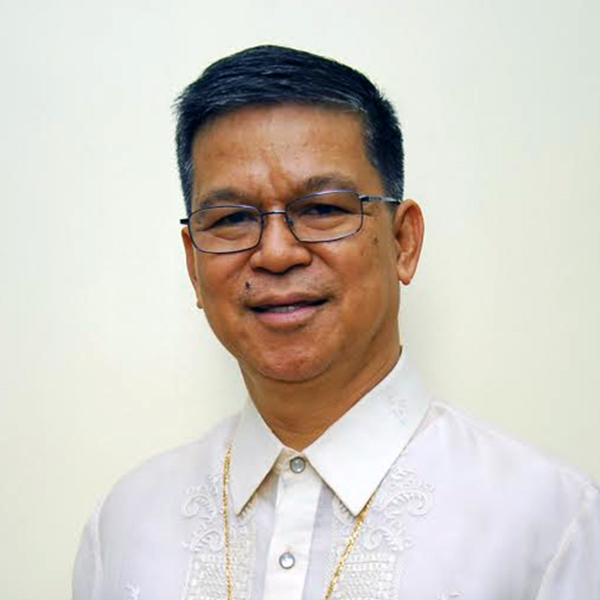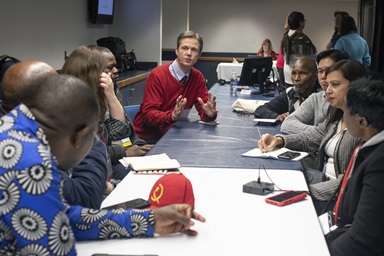We proclaim Christ by loving our indigenous community
By Bishop Ciriaco Q. Francisco
January 25, 2017

Courtesy photo of Bishop Ciriaco Q. Francisco.
Luke records a significant event in Christ’s launching of his mission:
When he came to Nazareth, where he had been brought up, he went to the synagogue on the Sabbath day, as was his custom. He stood up to read, and the scroll of the prophet Isaiah was given to him. He unrolled the scroll and found the place where it was written: “The Spirit of the Lord is upon me, because he has anointed me to bring good news to the poor. He has sent me to proclaim release to the captives and recovery of sight to the blind, to let the oppressed go free, to proclaim the year of the Lord’s favor.” … Then he began to say to them, “Today this scripture has been fulfilled in your hearing.” (4:16-19, 21; The New Oxford Annotated Bible)
Very early on, Lukan Gospel identified Jesus as Savior and Messiah (2:11), and this is the role he fulfills in numerous ways. Jesus communicated the presence of divine salvation for those who dwelt on the peripheries of society. This is congruent with his inaugural proclamation: “The Spirit of the Lord is upon me! He has anointed me! He has sent me to proclaim good news to the outcast!” (4:18)
Jesus went home to Nazareth. Nazareth was a Jewish community with a synagogue, a local place for the believers of Yahweh to worship and hear or learn the Torah or the Tanakh. As was his custom during Sabbath, Jesus attended the worship service (v. 16) and was given the opportunity to be their rabbi to read and expound the text (vv. 17-21). In the reading of the day, the text Isaiah 62:1-2 was providentially chosen by the Lord. Jesus’ declaration of messianic fulfillment, “Today this scripture has been fulfilled in your hearing (v. 21),” was a defining and historic moment both for the salvation of that local congregation of Judaism and to the whole Jewish nation as people of God’s covenant, but to that specific assembly who should have received the greatest blessing of God’s promise became a huge loss because of their rejection of the Messiah.
What made them extremely mad at Jesus (vv. 28-29)? Their initial reaction to Jesus was strikingly positive (v. 22) but in verses 24-27 where Jesus refers to historical facts about gentiles blessed by the Lord outside the covenant people of Israel where the prophets Elijah with the widow at Zarephath in Sidon and Elisha who healed Naaman the Syrian General. The Hebrew prophets respectively were used by God to bless Gentiles (1 Kings 17.8-16; 2 Kings 5.1-4). The so-called Jewish believers in Nazareth called by the Lord to become light to the gentile world became extremely exclusivist, Gentilephobic and racist that even the Messiah who belonged to their race was expelled and no longer welcome into their midst. Jesus, the heart of the fulfillment of God’s reign and great jubilee, became an outcast from his own community. The very people he came to save were the ones who rejected him. Jesus went on his way (v. 30) and pursued the realization of God’s reign: the saving of disenfranchised peoples, Jews and gentiles alike.
The Lukan Church, the 1st-century followers of Christ who were recipients of the letters of Luke to Acts responded to the messianic fulfillment and mission in faith and obedience to Jesus Christ.
The passage above is relevant with The United Methodist Church’s mission today in solidarity with the indigenous people in the Philippines. United Methodists in Mindanao — specifically in the Davao Episcopal Area — tried to model our response to the plight of our indigenous communities by deliberately resisting the model of the Synagogue on Nazareth, which rejected Christ, and earnestly struggled to abide to the Lukan Church model of proclaiming Christ’s messianic mission that is holistic and inclusive in scope and radically transformative. We sought to create a redeeming, reconciling, restorative and liberating avenue of solidarity with the Lumads (indigenous people in Southern Philippines). We conveyed to them in concrete or tangible ways that they are not forgotten and forsaken by God, since those who profess faith in Christ are journeying with them to freedom and abundant life even when government becomes apathetic to them.
Faithful to our Methodist vision and mission of making disciples of Jesus Christ to transform communities, fellow United Methodists in Cotabato, Mindanao, have engaged in risk-taking mission work in sheltering Lumad farmers after a protest demanding rice turned deadly. My heart was bleeding, seeing them being deprived of rice while witnessing indigenous people suffering from human rights violations.
On April 1, the farmers protested, demanding rice from government officials who were tasked to release calamity funds intended for them as El Niño-related drought dragged on. The protest turned deadly when three people were killed and others wounded when police opened fire, according to news reports. Our United Methodist compound in Kidapawan City harbored about 4,000 protesters, which sparked tension with local authorities. Some farmers escaped arrest and have gone home while those detained by police have been freed.
Fellow United Methodists and I testified at Senate hearings in Manila concerning the April 1 shooting deaths in Kidapawan City. Manny Mahipus, our Davao Episcopal Area chancellor, said the protest turned violent when police insisted on breaking up the picketing and forcing farmers to go home, but they refused to go and police opened fire. One of the local farmers, Arlene Amar, testified about the drought destroying her crops: “We can survive not eating thrice a day, but we will never ever allow that our kids starve.” She recalled telling her children, “Let us just wait and we will have rice soon.”
After the incident, in our April 17 worship service in Quezon City, I emphasized — as a Christian and pastor — that the church’s role is to lead God’s people from despair to hope and from slavery to freedom.
To concretize this mission, I have stressed that the Davao Episcopal Area in the Philippines engage in risk-taking mission work by helping the local farmers, even the Lumad people. Our decision to offer sanctuary to the starving families was done in obedience to Christ but was defiant in the face of criticism and danger.
As a bishop who has a direct administrative function of Spottswood Methodist Center, which offered sanctuary to desperate farmers, I testified before two senate hearings about the incident. I spoke of the ministry of The United Methodist Church in offering sanctuary to all people whose lives were in danger and in need of a place of refuge. I insisted that it is never a sin when poor farmers demand food, but it is a sin to deny them food. I reiterated to fellow followers of the Messiah that we must live to the standard of ministry set by Jesus. I believe this is the call to all faithful disciples of the Lord.
In my testimony in a Senate hearing, I decried the tight security authorities placed against our own compound. I said to them that our church has a long tradition of providing sanctuary to those in need. I testified that what we have done as Christians is true to our commitment as a Church — being faithful to care for the people, the poor, the needy, and to those in need of a place for refuge. I have mentioned to them about the police who blocked church members from entering or leaving the church, ordering them to sign a logbook — even though these were our own people and themselves by church membership co-owners of the property. I felt the police were there to hold up food donations to the hungry farmers.
My two colleagues in the United Methodist College of Bishops have joined me in this endeavor to solidify our solidarity with our Lumad brethren in their desperate need. Manila Episcopal Area Bishop Rodolfo A. Juan condemned authorities’ search of the United Methodist compound and threats to Bishop Francisco while Baguio Episcopal Area Bishop Pedro M. Torio Jr. joined in a pastoral letter about the April 1 shootings, calling the incident “abominable.”
Through this journey, we United Methodists in the Philippines convey to the Lumad people in concrete or tangible ways that they are neither forgotten nor forsaken by the living God, since those who profess faith in Christ are journeying with them to real freedom and abundant life.
Bishop Ciriaco Q. Francisco is presently assigned to the Manila Episcopal Area in the Philippines.
Return to the Many Voices, One Faith home page
Like what you're reading? Support the ministry of UM News! Your support ensures the latest denominational news, dynamic stories and informative articles will continue to connect our global community. Make a tax-deductible donation at ResourceUMC.org/GiveUMCom.




